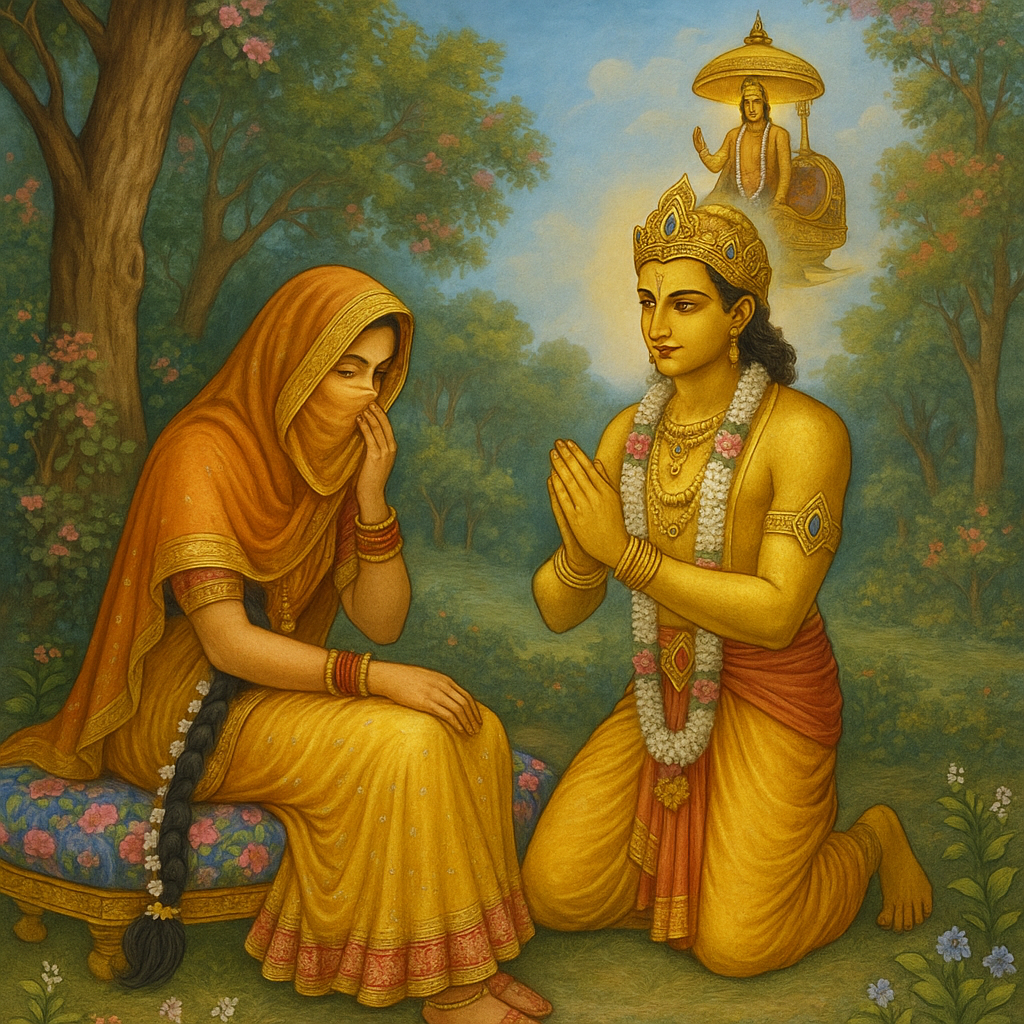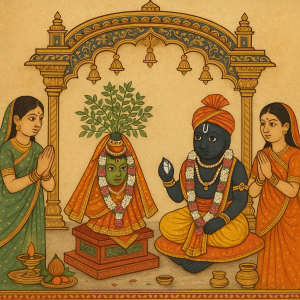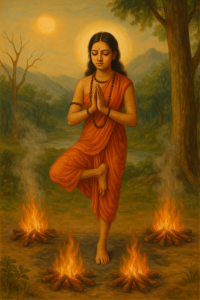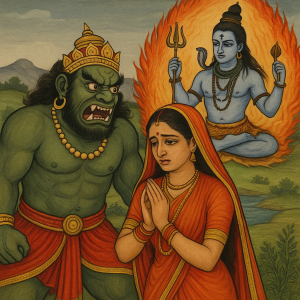The First Glance of Divine Lovers
At the sacred forest of Badarikāśrama, the time had finally arrived when destiny would bring together the two eternal lovers—Tulasī Devī and Śaṅkhacūḍa.
Tulasī was engaged in her daily spiritual practices when she saw, in the distance, a radiant jeweled airplane descending from the sky. Upon it stood a glorious young man in the prime of his youth. His body glowed like a freshly bloomed campaka flower. He looked like Cupid personified, adorned in dazzling ornaments and silken garments.
His face was full and beautiful like the autumn moon. His lotus-like eyes were gentle and enchanting, his cheeks gleamed with the brilliance of his earrings, and he wore a garland made of heavenly pārijāta flowers. Musk and saffron perfumed his body, and his limbs glistened with sandalwood paste.
Tulasī, seeing this majestic youth approach, modestly covered her face with her shawl. Yet she could not help but glance at him again and again from the corner of her eye. Her heart fluttered. Her body blushed, and her lips gently curved into a shy smile. She bowed her head, overcome with both shyness and curiosity.
Śaṅkhacūḍa’s Courteous Approach
As the airplane landed and Śaṅkhacūḍa descended, he saw Tulasī seated on a flower-decorated bed, her golden complexion glowing in the sunlight. Her beauty was beyond compare. Her lips shone like bimba fruit, her nose was elegant, and her eyes wide and calm. A line of sandalwood paste and vermilion adorned the part of her hair, enhancing her divine features.
Her hands and feet were crimson-colored like lac-dye, her palms glowed red, and her fingers sparkled with jewel-studded rings. She wore anklets, bangles, and garlands that jingled softly, and her thick braid was decorated with jasmine flowers.
Overcome by her grace and charm, Śaṅkhacūḍa approached with folded hands and asked,
“O most beautiful one, who are you? Whose daughter are you? And how did you come to this lonely forest? Your presence radiates heavenly joy.”
But Tulasī did not reply.
He smiled and said, “O gentle lady, why do you remain silent? I am your humble servant. Please speak to me with the melody of your voice.”
Tulasī’s Test
Finally, Tulasī spoke—softly, but firmly.
“My name is Tulasī. I am the daughter of King Dharmadhvaja and am engaged here in ascetic practices. But who are you? Why are you speaking to me in this way? It is improper for a noble man to converse with a woman alone in the forest. Please go elsewhere.”
Śaṅkhacūḍa stood still.
Tulasī, her voice now filled with fiery renunciation, continued:
“Scripture declares that a man who desires a woman is degraded. A woman’s sweet words are like honey, but her heart is poison. She pretends to be cheerful, but her nature is selfish and cunning. She is a distraction to the spiritual path, a hindrance to liberation. Even great sages are bewildered by her charm.”
She described women as inconsistent, sensually driven, and a cause of bondage for men. “A wise man should never trust or follow a woman. Even the Vedas struggle to understand her character. She is false like a dream and impure like a pot of waste. God created her to be an obstacle for those desiring liberation.”
Her words were sharp and cutting.
Śaṅkhacūḍa’s Gentle Reply
Śaṅkhacūḍa smiled calmly. His reply was full of wisdom and understanding.
“O goddess, your words contain truth, but only partially. There are indeed women who embody vice—but there are also women of the highest character, such as Lakṣmī, Sarasvatī, Durgā, Sāvitrī, and Rādhā. Women who are expansions of these divine personalities are glorious, virtuous, and pure. They are worshiped in all ages.”
“There are women in the mode of goodness, and they are paragons of chastity. Those in the modes of passion and ignorance may be unchaste, insincere, and drawn to sense pleasures. But even among men, there are saints and sinners. So why judge all women alike?”
He continued, “I am not here out of lust. I am here by the order of Lord Brahmā, to marry you through the Gandharva rite, a sacred marriage by mutual consent. I am your destined husband.”
“My name is Śaṅkhacūḍa. The demigods flee at the sight of me. But my real identity is that I was once Sudāmā, a cowherd boy in Goloka, Kṛṣṇa’s intimate friend. You were also there, Tulasī. You know it. When Rādhārāṇī saw us together, She cursed us both to be born on Earth. I remember everything, just as you do.”
Tulasī Reveals Her Intentions
Tulasī’s expression changed. Her eyes softened, and her lips curved into a smile.
“O noble one,” she said gently, “I spoke those harsh words only to test your character. A woman should never surrender to a man unless he is qualified, learned, peaceful, and virtuous. A man conquered by a woman loses his dignity and becomes impure. Even the ancestors and gods refuse offerings from such a person.”
“But you are noble, pure, and wise. I desired to see whether you would be conquered by passion or remain rooted in knowledge. You have passed the test. Therefore, I accept you as my husband.”
She then quoted various śāstras about the importance of choosing a worthy spouse. She warned that giving a daughter in marriage to an ignorant or cruel man is equal to the sin of brahma-hatyā (killing a brāhmaṇa). But giving her to a Vaiṣṇava—peaceful, wise, and devoted—is a blessing greater than ten horse sacrifices.
She also condemned those who sell their daughters for money, stating that such men fall into hell for eons, forced to consume their daughters’ waste in infernal realms.
Lessons to Be Learned
1. Testing Before Trusting Is Wisdom
Tulasī’s initial harsh speech was not an expression of hate, but a spiritual test. A pure devotee does not surrender the heart lightly. Śrīla Prabhupāda explains that one should carefully examine before accepting a guru or spouse, as these relationships shape one’s entire spiritual path.
2. The Dangers of Lust and Flattery Are Real
Tulasī’s fierce warnings about lust and female enticement reflect a larger spiritual truth: material attraction, when not spiritualized, can become the greatest distraction from Kṛṣṇa. As Prabhupāda taught, māyā enters subtly—through unchecked desire, flattery, or pride.
3. True Vaiṣṇava Marriage Is Based on Character and Dharma
Śaṅkhacūḍa’s dignity, wisdom, and knowledge of śāstra revealed that spiritual marriage is not based on appearance or wealth, but on shared values, inner purity, and destiny.
4. Every Soul Has a Divine History
Śaṅkhacūḍa and Tulasī both remembered their past lives in Goloka. This teaches that the jīva is eternal and carries deep impressions (saṁskāras) across births. Śrīla Prabhupāda confirmed that our real home is with Kṛṣṇa, and our life should be aimed at returning there.
5. Speech Must Be Used for Upliftment
Although Tulasī spoke harshly, her motive was upliftment, not insult. Śrīla Prabhupāda said that even strong preaching must be done with compassion and a goal to benefit the soul, not to condemn.
6. Kṛṣṇa Consciousness Recognizes the Value of Women
Contrary to blanket condemnation, Śaṅkhacūḍa praises women like Lakṣmī, Rādhā, and Sarasvatī. This reflects the Vaiṣṇava understanding that devotees, male or female, can attain the highest realization when they live in purity and devotion.



